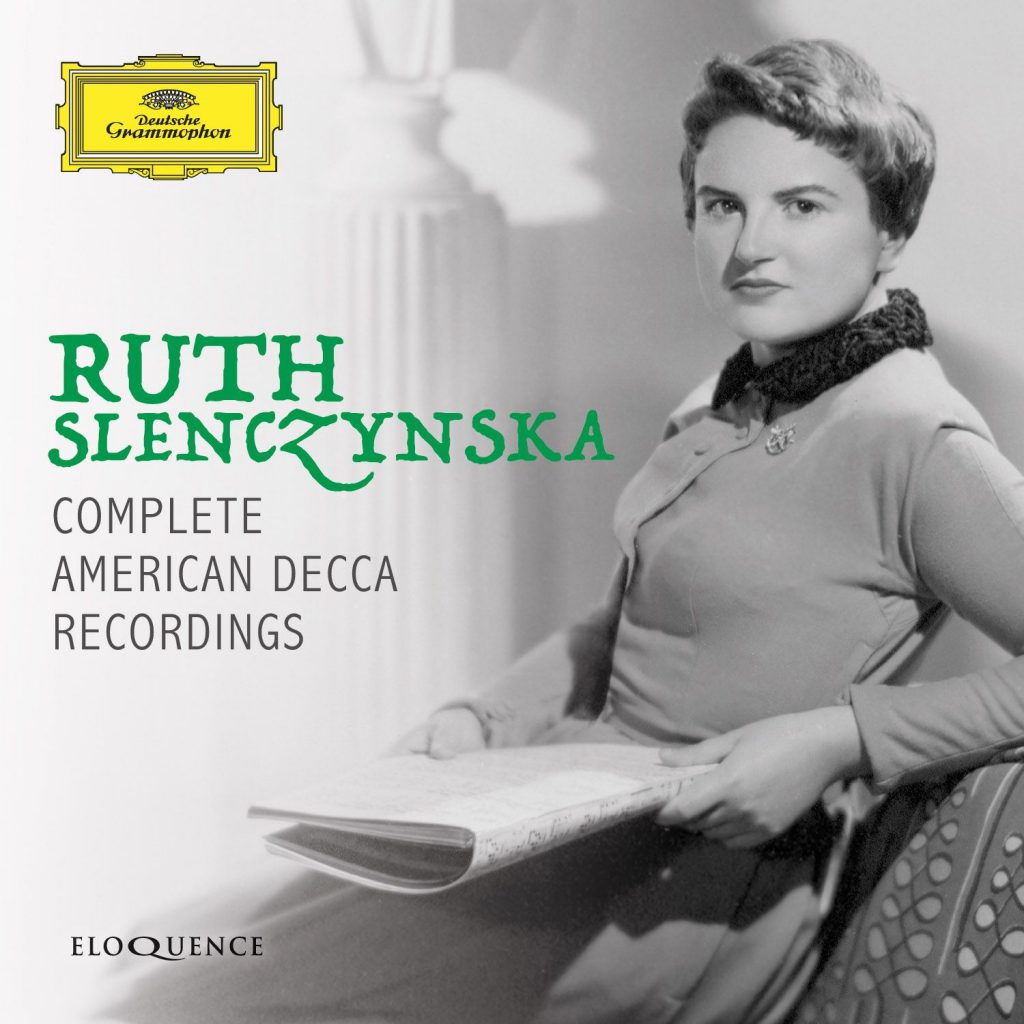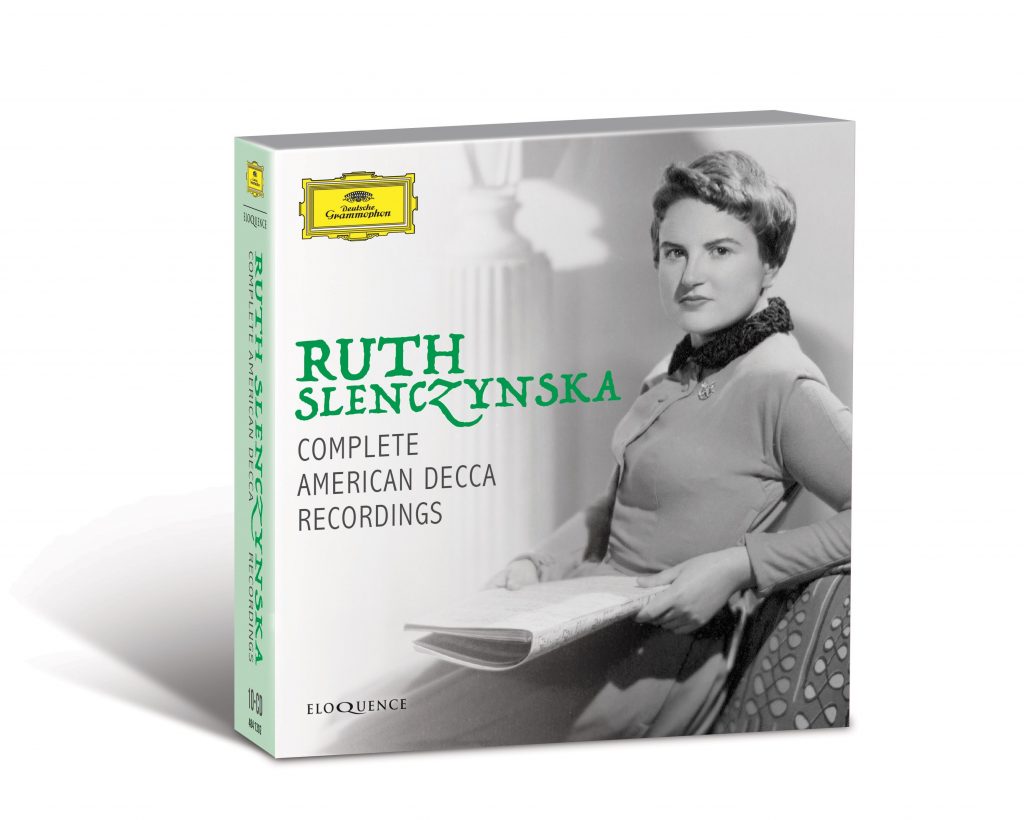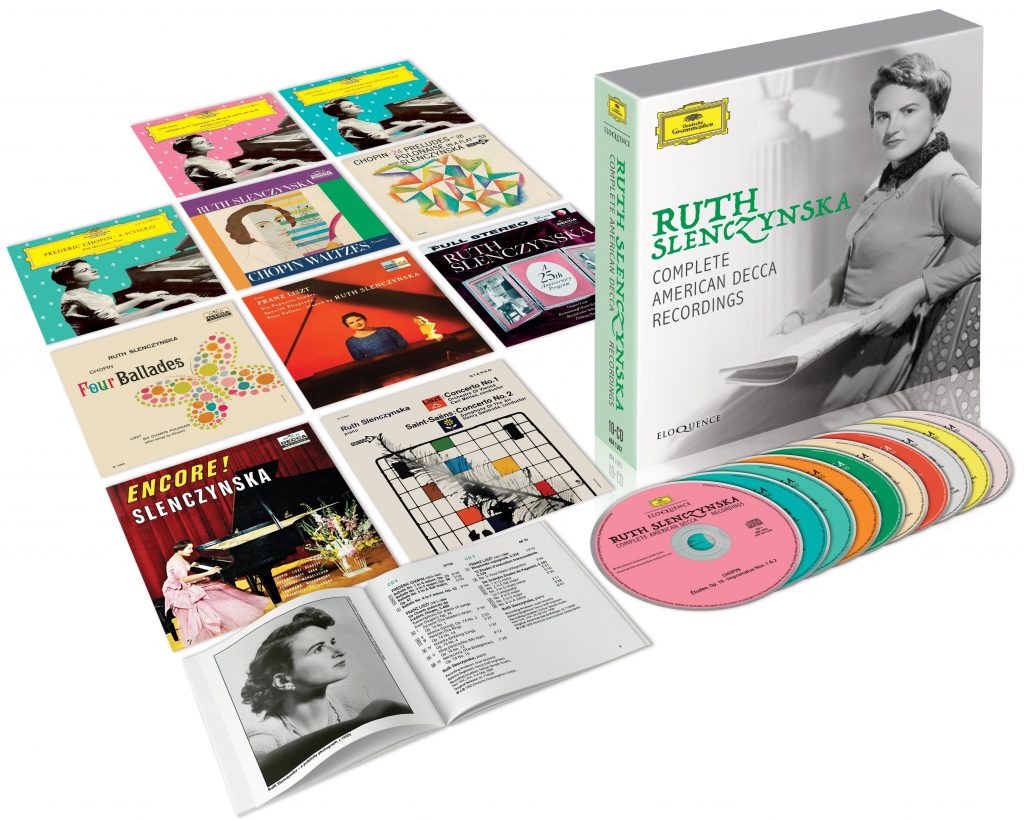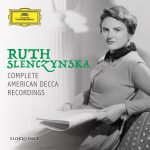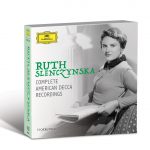A debut on CD for the American Decca legacy of Ruth Slenczynska, a prodigious Romantic-age keyboard lioness.
The biography for her Wigmore Hall recital in March 1957 claimed that the 32-year-old Ruth Slenczynska had given 1600 concerts. Scarcely believably, perhaps, but no less so than other elements of her extraordinary life story – making her public debut at the age of four, under the instruction of a tyrannical and abusive father, playing a Mozart concerto at the Salle Pleyel in Paris just three years later, attracting the admiration and tutelage of Cortot and Rachmaninov, apparently burnt out before adulthood.
A first marriage and highlights such as playing for (and duets with) Harry Truman followed. Touring with Arthur Fiedler and Boston Pops in the mid-50s taught Slenczynska how to work an audience and to draw strength from their attention, but she readily understood the imperatives of the microphone. The year before her Wigmore Hall date she began recording for the American Brunswick division of Decca at the label’s New York studios, and once their sales were boosted by the publication of her painfully honest autobiography in 1957, her albums won acclaim on both sides of the Atlantic. She has continued to perform and to teach well into her 90s, but this box is the first comprehensive tribute to her artistry.
Born in California to Polish parents, Slenczynska was a Chopin pianist by nature and nurture, with a temperament and background that tended towards the extremes of the Romantic style, abounding in rubato and timbral nuance. The facility and security of her technique were shown to best advantage by the Études (1956), then the Scherzos (1957), followed by a selection of waltzes (1959), the Ballades and Polish songs arranged by Liszt (1960) and the Préludes (1962). A Liszt album from 1958 tests her bullet-proof technique with the exigent demands of the Rhapsodie espagnole, Feux follets and the most gravity-defying versions of the Grandes Études de Paganini. A mixed recital from 1957 marks the silver jubilee of her debut at New York City Hall. The Brunswick discography is rounded off with a disc of encores (1959) and a pair of concertos, Saint-Saëns’ Second (1959) and Liszt’s First (1963).
By the time of these recordings, Slenczynska had thrown off the prodigy tag and her musicianship had matured accordingly from machine-tooled virtuosity to lyrical fantasy. The pianism presented here is extraordinary, and shows no trace of a performer who had learned her craft through the harshest discipline and punishment. The first release of these albums on CD is celebrated in style by Eloquence with an ‘original covers’ box and a booklet full of hitherto unpublished photographs and memorabilia as well as a new survey of Slenczynska’s life and studio career by Stephen Siek.
CD 1
FRÉDÉRIC CHOPIN (1810–1849)
12 Études, Op. 10
Impromptu No. 1 in A flat major, Op. 29
Impromptu No. 2 in F sharp major, Op. 36
CD 2
FRÉDÉRIC CHOPIN (1810–1849)
12 Études, Op. 25
Impromptu No. 3 in G flat major, Op. 51
Impromptu No. 4 in C sharp minor, Op. 66 ‘Fantasie-Impromptu’
CD 3
FRÉDÉRIC CHOPIN (1810–1849)
Scherzo No. 1 in B minor, Op. 20
Scherzo No. 2 in B flat minor, Op. 31
Scherzo No. 3 in C sharp minor, Op. 39
Scherzo No. 4 in E major, Op. 54
CD 4
FRÉDÉRIC CHOPIN (1810–1849)
Grande Valse brillante in E flat major, Op. 18
Three Waltzes, Op. 34
Waltz in A flat major, Op. 42 ‘Grande Valse’
Three Waltzes, Op. 64
Two Waltzes, Op. 69
Three Waltzes, Op. posth. 70
Waltz in E flat major, Op. posth.
Waltz in E major, Op. posth.
Waltz in E minor, Op. posth.
CD 5
FRÉDÉRIC CHOPIN (1810–1849)
24 Preludes, Op. 28
Polonaise in A flat major, Op. 53
CD 6
FRÉDÉRIC CHOPIN (1810–1849)
Ballade No. 1 in G minor, Op. 23
Ballade No. 2 in F major, Op. 38
Ballade No. 3 in A flat major, Op. 47
Ballade No. 4 in F minor, Op. 52
FRANZ LISZT (1811–1886)
Six Chants polonaise de Frédéric Chopin, S.480
Transcriptions for piano of songs from Chopin’s Op. 74
CD 7
FRANZ LISZT (1811–1886)
Rhapsodie espagnole, S.254
Feux follets (No. 5 of 12 Études d’exécution transcendante)
Six Grandes Études de Paganini, S.141
CD 8
J.S. BACH (1685–1750)
Chromatic Fantasia and Fugue in D minor, BWV 903
FRÉDÉRIC CHOPIN (1810–1849)
Nocturne in B flat minor, Op. 9 No. 1
FELIX MENDELSSOHN (1809–1847)
Rondo capriccioso in E major, Op. 14
SERGEI RACHMANINOV (1873–1943)
Prelude in C sharp minor, Op. 3 No. 2
DOMENICO SCARLATTI (1685–1757)
Sonata in G major, Kk 455
BÉLA BARTÓK (1881–1945)
Six Romanian Folk Dances, BB 68 (Sz.56)
ROBERT SCHUMANN (1810–1856)
Arranged by Franz Liszt (1811–1886)
Liebeslied (Widmung), S.566
CLAUDE DEBUSSY (1862–1918)
La fille aux cheveux de lin (Préludes: Book I)
FRANZ LISZT (1811–1886)
Hungarian Rhapsody No. 15
CD 9
J.S. BACH (1685–1750)
Prelude in E major, BWV 937
FELIX MENDELSSOHN (1809–1847)
Spinning Song, Op. 67 No. 1
FRANZ SCHUBERT (1797–1828)
Moment musical in F minor, Op. 94 No. 3
SERGEI PROKOFIEV (1891–1953)
Suggestion diabolique
FRANZ LISZT (1811–1886)
Hungarian Rhapsody No. 12
SERGEI RACHMANINOV (1873–1943)
Prelude in A minor, Op. 23 No. 6
MODEST MUSSORGSKY (1839–1881)
Hopak (Sorochintsy Fair)
ROBERT SCHUMANN (1810–1856)
Der Kontrabandiste (arr. Tausig)
CLAUDE DEBUSSY (1862–1918)
Clair de lune (Suite bergamasque)
HEITOR VILLA-LOBOS (1887–1959)
Moreninha (Prole do Bebe)
FRÉDÉRIC CHOPIN (1810–1849)
Polonaise No. 6 in A flat major, Op. 53
CD 10
FRANZ LISZT (1811–1886)
Piano Concerto No. 1 in E flat major, S. 124
Wiener Symphoniker
Carl Melles
CAMILLE SAINT-SAËNS (1835–1921)
Piano Concerto No. 2 in G minor, Op. 22
Symphony of the Air
Henry Swoboda
RUTH SLENCZYNSKA, piano
FIRST RELEASE ON CD
CD 1
Recording Producer: Israel Horowitz
Balance Engineers: Decca Staff engineers
Recording Location: Pythian Temple Studio, New York, USA, July 1956–September 1956
Original American Decca Release: DL 9890
CD 2
Recording Producer: Israel Horowitz
Balance Engineers: Decca Staff engineers
Recording Location: Pythian Temple Studio, New York, USA, July–September 1956
Original Release: DL 9891
CD 3
Recording Producer: Israel Horowitz
Balance Engineers: Decca Staff engineers
Recording Location: Pythian Temple Studio, New York, USA, June and September 1957
Original American Release: DL 9961
CD 4
Recording Producer: Israel Horowitz
Balance Engineers: Decca Staff engineers
Recording Location: Pythian Temple Studio, New York, 13–15 May 1959
Original Release: DL 710017
CD 5
Recording Producer: Israel Horowitz
Balance Engineers: Decca Staff engineers
Recording Location: Pythian Temple Studio, New York, USA, 16–18 May 1962
Original Release: DL 710059
CD 6
Recording Producer: Israel Horowitz
Balance Engineers: Decca Staff engineers
Recording Location: Pythian Temple Studio, New York, USA, 3–6 May 1960
Original Release: DL 710029
CD 7
Recording Producer: Israel Horowitz
Balance Engineers: Decca Staff engineers
Recording Location: Pythian Temple Studio, New York, USA, 22–28 July 1958
Original American Decca Release: DL 71000
CD 8
Recording Producer: Israel Horowitz
Balance Engineers: Decca Staff engineers
Recording Location: USA, 23-25, 27 September 1957
Original American Decca Release: DL 79991
CD 9
Recording Producer: Israel Horowitz
Balance Engineers: Decca Staff engineers
Recording Location: USA, 15–17 April 1958
Transfers and Restoration: Mark Obert-Thorn
Original American Decca Release: DL 79991
CD 10
Recording Producers: unknown (Liszt); Israel Horowitz (Saint-Saëns)
Balance Engineers: Symphonia Studio (Liszt); Decca Studio engineers (Saint-Saëns)
Recording Locations:, Konzerthaus, Mozartsaal, Vienna, 9–10 April 1963 (Liszt); Manhattan Center, New York, USA, 26 June 1959 (Saint-Saëns)
Original American Decca Release: DL 10084
‘Ruth Slenczynska has technique to burn, has it under complete control, and uses it with masculine vigour and shrewd musicianship.’ High Fidelity, May 1957 (Chopin, Etudes)
‘Still in her early 30s, Slenczynska gives a breathtaking display of prestidigitation, accurate, effortless, with pleasant tone and musical sympathy thrown in for good measure.’ The Times, July 1958 (Chopin, Etudes)
‘Her interpretation of the Chromatic Fantasy and Fugue is thoughtful and clearly articulated, as is her handling of the Scarlatti sonata… The encore album comes off with equal success.’ High Fidelity, April 1959 (25th Anniversary Album, Encores)
‘Her pianism sounds notably more cohesive and forthright than in the past… Miss Slenczynska sweeps through [the A flat Polonaise] with exciting bravura and propulsion.’ High Fidelity, April 1959 (Chopin, Préludes etc.)

